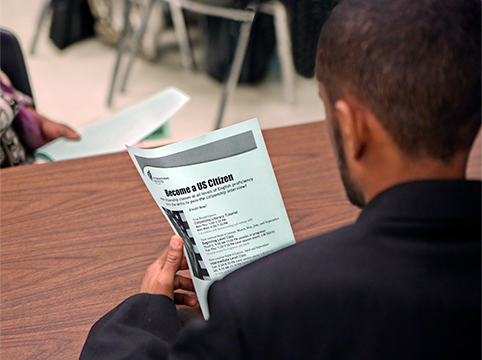Improving English Through Telephone Conversation

International Institute of St. Louis (IISTL) Supports Naturalization Interview Preparation with Citizenship Telephone Conversation Partners Program
The IISTL has been providing a range of services to the community of St. Louis, Missouri, for almost 100 years. Immigration services include refugee resettlement, employment and training assistance, and support for vulnerable populations, in addition to varying English, citizenship, and computer classes. In a modernized approach to citizenship instruction services, the institute recruits local volunteers to assist intermediate to advanced-level students through the Citizenship Telephone Conversation Partners Program (Citizenship TCP).
Through the Citizenship TCP Program, IISTL provides both the students and volunteers with an orientation, training, guide book, and oversight. The program is especially useful as a supplement for students who are preparing for the upcoming naturalization interview but may not have time to attend a citizenship class, or whose level is higher than the levels being offered at the time. Additionally, students who are excelling in the intermediate-level citizenship class can benefit from the additional study and practice.
The institute begins by identifying and then matching available volunteer tutors with students in the intermediate to advanced-levels. IISTL then welcomes the tutors with a training and orientation, a booklet of lessons, instructional tips, and reporting procedures. The training is currently conducted by an AmeriCorps member under the supervision of the Project Manager. The students are provided with the same orientation and booklet in advance of the phone calls as well. The Citizenship Telephone Conversation Partners Program booklet contains instructions on how to review the twelve lessons that cover topics pertaining to the naturalization interview including U.S. history, the legislative branch, and citizenship rights and responsibilities. The orientation booklet even provides practice lessons that both the students and tutors can use to guide the content they cover each week.
Students and tutors speak weekly over the phone for at least 30 minutes while reviewing practice lessons. Each lesson contains questions in the following categories: warm up questions (to practice small talk), Oath of Allegiance, Form N-400, application for naturalization questions, and U.S. history and government questions. During the phone call, tutors ask students questions such as “What promises do you make when you take the Oath of Allegiance?” Brenda, a volunteer in the program who began working with a student named Netra said, “We completed our introduction to the program, getting acquainted a bit, and Lesson 1. Netra is quite enthusiastic about the program and pleased to get started.”
At the close of the program, students complete a mock interview with their telephone tutor where they answer ten questions from the Form N-400, ten civics questions, and finish by reading the Oath of Allegiance. The tutors then complete a final report evaluating the student’s performance in the mock citizenship interview which can be used to identify where students require extra help in the classroom.
Another volunteer, Jim, is partnered with Mahjid in the telephone conversation partners program. In an August 2017 report to IISTL Jim shared, “We find we can complete two or three lessons in a single phone call, because Mahjid is so well prepared. He still [does] not have a date for his citizenship test. He will call me when the test gets closer, so we can practice more.”
Since the program’s success relies upon the active and sustained participation of both the students and the tutors, keeping both groups engaged can prove challenging. The program manager oversees the program’s achievements by asking tutors to report on how the telephone practice goes within 48 hours of each call by submitting a report. The volunteers are encouraged to provide feedback on the program within these reports as well. The program manager also follows up with the tutors if needed to ensure they are meeting the reporting requirements.
In an effort to keep a steady stream of volunteers in the program, IISTL keeps experienced volunteers participating in each cycle. If students are waiting for an available tutor, they are encouraged to practice for the naturalization interview on their own using USCIS resources. Students are also kept accountable through the program manager’s policy to discontinue their participation after they miss consecutive scheduled telephone conversations. This not only ensures that the tutors feel their time is valued, but urges students to communicate about scheduling conflicts as well. There are 15 volunteers on standby for the program making it feasible for the program to run for 10 months of the year. There are typically two to five students participating in the program at all times.
IISTL’s Citizenship Telephone Conversation Partners Program provides citizenship students the opportunity to improve their level of comfort with English comprehension and pronunciation, while simultaneously strengthening their knowledge of civics topics. Further, the program boosts students’ understanding of the meaning behind the Oath of Allegiance and the questions they will fill out on the application itself, bringing a greater sense of ease to the process of naturalization.
